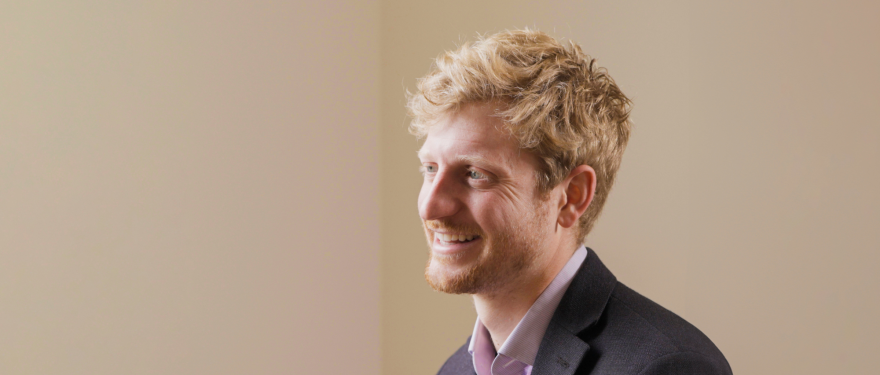Erik Roberts (MBA 2024) often pauses for quite some time before answering questions. He laughs and says he can be verbose—that he needs a moment because he wants to answer succinctly and thoughtfully. For someone who wants to change hearts and minds, this tracks. Roberts is graduating with his MBA from Harvard Business School (HBS) on May 23, 2024, and will be addressing his fellow classmates the day before, on Class Day, about the value of humility, generosity, and the importance of thinking and feeling deeply.
Upon graduating from the University of Virginia with a history degree, Roberts went into consulting to dip his toes into the field of business and discover his passions. He worked in sectors such as economic development and climate and sustainability, founded a nonprofit academy to deliver capability building programs to nonprofit professionals around the world, and had a stint at an autonomous vehicle infrastructure startup. An MBA, he said, was an opportunity to learn a new problem-solving language.
“I’ve thought about each step of my life as learning a new language—a dialect and a set of words that allow me to talk to people from all different places and walks of life,” said Roberts. “HBS was an opportunity to learn textbook business, meet people from all over the world and hear about their work and life, what motivates them, what they’re passionate about, what they see around them that is cool and unique. I wanted to think more deeply about what I want to do long term, the type of impact I want to have, and what I need to do to convince people to join me in the fight.”
Roberts’ chosen fight is climate change, and he’s aiming to do it via taste buds. After a summer internship at Gramercy Tavern in New York City and another adventure as a consultant, he has his sights set on opening a restaurant in Brooklyn—a locally sourced, plant-based venue.
“While at HBS I’ve come to believe that positive, joyful experiences change minds much more than intelligence, academia, debate, or anything else,” said Roberts. “I think you can change people's minds by making them really happy—and one way I want to do that is by giving them an incredible dinner. I want folks to leave the meal with some surprise that the food they just loved was mostly plants.”
The restaurant industry is notorious for its high-paced, high-stakes environment. For Roberts, it’s a chance to bring authentic, intentional leadership to a space that invites a singular focus, one where the outside world can melt away when creating and serving a culinary experience.
“I want to be a very values-based leader,” said Roberts. “I’ve been lucky to see different leaders—none better than my dad—and I will take many of the lessons I’ve learned from them into my leadership style. The top ones are being humble—nothing is above me, nothing is below me—and leading from the heart. I care more about the heart than the work output. It’s about bringing your full self to work, taking pride in what you do, and showing up with a sense of purpose.”
Roberts credits his family as his primary influence. As the youngest of three, with a sizable age gap between him and his older sisters, he was given a long leash and the foundational values of creating and maintaining strong senses of self, community, and humor.
“I have a deeply held belief that I should be learning from every single person I encounter,” said Roberts. “My dad’s biggest leadership quality was being self-actualized—a very hard bar to meet. No one knew himself better than my father did. He had a crystalline sense of who he was, what he wanted to do in the world, and what was important to him. He was incredibly authentic as a result.”
Roberts holds that alongside his mother’s ability to seamlessly adapt and get along with “anyone, anywhere, any time,” one sister’s openness to the world, and the other’s sound sense of right and wrong. These lessons on how to live a life: with an open heart, intention, authenticity, and moments for deep, quiet thinking, have shaped who he is and hopes to become.
“I never want to lose my childlike sense of joy and wonder,” he says. “When you get older you feel like you’re supposed to ‘be an adult,’ meaning being more even keeled, but I want to keep it. When you can turn passion into your work and you don’t ruin the passion, that’s nirvana.”
When Roberts stands on stage in front of his family, his classmates, and their families and loved ones, he says that underneath the nerves he’ll be feeling incredibly lucky.
“I want to share my family’s values and send my classmates off with something they’ll hopefully think about and that will influence their behavior for a long time. In a few months or years from now, I want us to take a step back, to look at ourselves and be proud of what we’re doing with this degree, our privilege, and our power.”
This article was originally published on the HBS Newsroom page.

